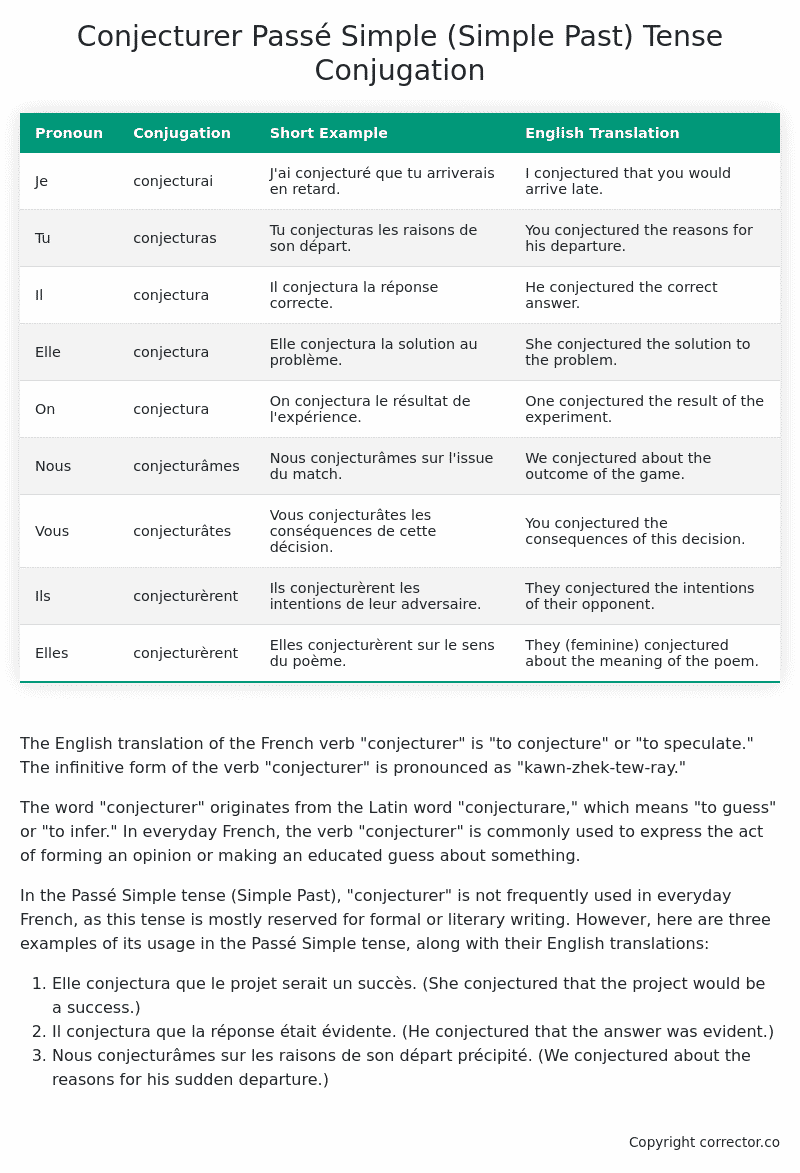Passé Simple (Simple Past) Tense Conjugation of the French Verb conjecturer
Introduction to the verb conjecturer
The English translation of the French verb “conjecturer” is “to conjecture” or “to speculate.” The infinitive form of the verb “conjecturer” is pronounced as “kawn-zhek-tew-ray.”
The word “conjecturer” originates from the Latin word “conjecturare,” which means “to guess” or “to infer.” In everyday French, the verb “conjecturer” is commonly used to express the act of forming an opinion or making an educated guess about something.
In the Passé Simple tense (Simple Past), “conjecturer” is not frequently used in everyday French, as this tense is mostly reserved for formal or literary writing. However, here are three examples of its usage in the Passé Simple tense, along with their English translations:
- Elle conjectura que le projet serait un succès. (She conjectured that the project would be a success.)
- Il conjectura que la réponse était évidente. (He conjectured that the answer was evident.)
- Nous conjecturâmes sur les raisons de son départ précipité. (We conjectured about the reasons for his sudden departure.)
Table of the Passé Simple (Simple Past) Tense Conjugation of conjecturer
| Pronoun | Conjugation | Short Example | English Translation |
|---|---|---|---|
| Je | conjecturai | J’ai conjecturé que tu arriverais en retard. | I conjectured that you would arrive late. |
| Tu | conjecturas | Tu conjecturas les raisons de son départ. | You conjectured the reasons for his departure. |
| Il | conjectura | Il conjectura la réponse correcte. | He conjectured the correct answer. |
| Elle | conjectura | Elle conjectura la solution au problème. | She conjectured the solution to the problem. |
| On | conjectura | On conjectura le résultat de l’expérience. | One conjectured the result of the experiment. |
| Nous | conjecturâmes | Nous conjecturâmes sur l’issue du match. | We conjectured about the outcome of the game. |
| Vous | conjecturâtes | Vous conjecturâtes les conséquences de cette décision. | You conjectured the consequences of this decision. |
| Ils | conjecturèrent | Ils conjecturèrent les intentions de leur adversaire. | They conjectured the intentions of their opponent. |
| Elles | conjecturèrent | Elles conjecturèrent sur le sens du poème. | They (feminine) conjectured about the meaning of the poem. |
Other Conjugations for Conjecturer.
Le Present (Present Tense) Conjugation of the French Verb conjecturer
Imparfait (Imperfect) Tense Conjugation of the French Verb conjecturer
Passé Simple (Simple Past) Tense Conjugation of the French Verb conjecturer (You’re reading it right now!)
Passé Composé (Present Perfect) Tense Conjugation of the French Verb conjecturer
Futur Simple (Simple Future) Tense Conjugation of the French Verb conjecturer
Futur Proche (Near Future) Tense Conjugation of the French Verb conjecturer
Plus-que-parfait (Pluperfect) Tense Conjugation of the French Verb conjecturer
Passé Antérieur (Past Anterior) Tense Conjugation of the French Verb conjecturer
Futur Antérieur (Future Anterior) Tense Conjugation of the French Verb conjecturer
Subjonctif Présent (Subjunctive Present) Tense Conjugation of the French Verb conjecturer
Subjonctif Passé (Subjunctive Past) Tense Conjugation of the French Verb conjecturer
Subjonctif Imparfait (Subjunctive Imperfect) Tense Conjugation of the French Verb conjecturer
Conditionnel Présent (Conditional Present) Tense Conjugation of the French Verb conjecturer
Conditionnel Passé (Conditional Past) Tense Conjugation of the French Verb conjecturer
Conditionnel Passé II (Conditional Past II) Tense Conjugation of the French Verb conjecturer
L’impératif Présent (Imperative Present) Tense Conjugation of the French Verb conjecturer
L’impératif Passé (Imperative Past) Tense Conjugation of the French Verb conjecturer
L’infinitif Présent (Infinitive Present) Tense Conjugation of the French Verb conjecturer
L’infinitif Passé (Infinitive Past) Tense Conjugation of the French Verb conjecturer
Le Participe Présent (Present Participle) Tense Conjugation of the French Verb conjecturer
Le Participe Passé (Past Participle) Tense Conjugation of the French Verb conjecturer
Struggling with French verbs or the language in general? Why not use our free French Grammar Checker – no registration required!
Get a FREE Download Study Sheet of this Conjugation 🔥
Simply right click the image below, click “save image” and get your free reference for the conjecturer Passé Simple tense conjugation!

Conjecturer – About the French Passé Simple (Simple Past) Tense
Formation
Usage
Narration
Historical Context
Interactions with other tenses
Passé Composé
Imparfait
Conditional and Subjunctive
Summary
I hope you enjoyed this article on the verb conjecturer. Still in a learning mood? Check out another TOTALLY random French verb conjugation!


